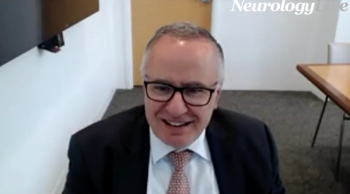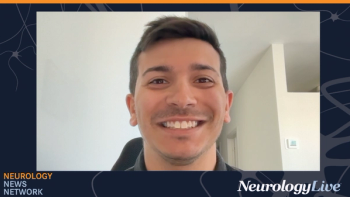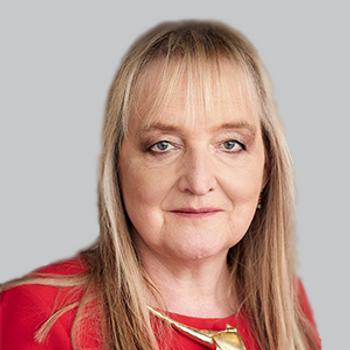
Treatment with DYNE-251 revealed dose dependent exon skipping and dystrophin expression as well as improvement in multiple functional end points in both cohorts of the phase 1/2 DELIVER trial.

Treatment with DYNE-251 revealed dose dependent exon skipping and dystrophin expression as well as improvement in multiple functional end points in both cohorts of the phase 1/2 DELIVER trial.

Tanya, a patient who lost her mobility due to undiagnosed spinal issues, discussed her life-saving surgery for spinal meningioma, and the complex surgical process she underwent to regain her strength.

The global head of neurology development at Sanofi provided insight on how tolebrutinib may overcome the challenges of treating non-relapsing secondary progressive multiple sclerosis. [WATCH TIME: 5 minutes]

Mind Moments®, a podcast from NeurologyLive®, brings you an exclusive interview with Imad Najm, MD, PhD. [LISTEN TIME: 22 minutes]

Based on the positive topline data, the company plans to submit for regulatory approval for a higher dose of nusinersen for spinal muscular atrophy treatment.

Treatment with vutrisiran was associated with benefits across multiple well-established clinical measures of disease progression compared with the placebo in patients with transthyretin-mediated amyloidosis with cardiomyopathy.

The director of Cleveland Clinic’s Epilepsy Center at the Cleveland Clinic Neurological Institute provided commentary on the future outlook of gene therapies for patients with epilepsy, and some of the knowledge and technical barriers clinicians currently face. [WATCH TIME: 5 minutes]

MRI scans showed that 99% of fenebrutinib-treated patients were free of T1 gadolinium-enhancing lesions, indicating minimal active inflammation.

Denali Therapeutics plans to seek accelerated FDA approval for DNL310 in Hunter syndrome, showing significant biomarker improvements and clinical benefits in ongoing trials.

Jim Cassidy, MD, PhD, chief medical officer at SpringWorks Therapeutics, talked about how the prioritization of mirdametinib, a promising treatment for both adult and pediatric patients with neurofibromatosis type 1-associated plexiform neurofibromas.

NeuroQuant previously received clearance from the FDA as a medical device intended for automatic labeling, visualization, and volumetric quantification of segmentable brain structures in MRI analysis.

The application is based on results of Prilenia Therapeutics’ phase 3 study that assessed the safety and efficacy of pridopidine in patients with Huntington disease.

AXS-07 has been supported by data from 2 major phase 3 trials in which treatment with the agent led to significant reliefs in pain freedom, the most bothersome symptoms, and acute medication use.

Despite failing to meet its primary end point, fosgonimeton showed greater numerical treatment effect in patients with more advanced disease, as well as those who were APOE e4 carriers.

The director of neurology and neuromuscular medicine at the Children’s Hospital of the King’s Daughters in Norfolk, Virginia, provided clinical perspective on some of the improvements in the everyday life and care of patients with spinal muscular atrophy.

The medical director of the Toronto Memory Program at the University of Toronto provided an in-depth overview of results from an ongoing phase 1 study assessing mivelsiran as a treatment for patients with early-stage Alzheimer disease. [WATCH TIME: 8 minutes]

Screening for DMD in Massachusetts is expected to begin by June 2026, which could enable earlier diagnosis and intervention.

The system is composed of the Neuroblade, a single-use multifunctional neuroendoscope; the Neuropad, a reusable medical-grade tablet; and Clearpath, a disposable transparent access sheath.

Tolebrutinib, a brain-penetrant BTK inhibitor, achieved the primary endpoint in the HERCULES study, significantly reducing disability accumulation in patients with non-relapsing secondary progressive multiple sclerosis.

Principal investigator Aliza Alter, MD, a pediatric neurologist at the Institute of Neurology in Livingston, New Jersey, provided commentary on a newly initiated phase 2/3 study assessing BHV-7000 as an antiseizure medication.

In a 3-month trial at two primary care sites, neurology referrals decreased by 77%, and brain MRI scans dropped by 35%.

Here's some of what is coming soon to NeurologyLive® this week.

For the majority of patients who were either aquaporin-4-antibody seropositive or seronegative, rituximab was the first disease-modifying therapy administered for neuromyelitis optica spectrum disorder.

Test your neurology knowledge with NeurologyLive®'s weekly quiz series, featuring questions on a variety of clinical and historical neurology topics. This week's topic is on chronic migraine.

Mirdametinib, a treatment in development for adult and pediatric patients with neurofibromatosis type 1-associated plexiform neurofibromas, was granted a PDUFA target action date of February 28, 2025.

Neurology News Network. for the week ending August 31, 2024. [WATCH TIME: 4 minutes]

Take 5 minutes to catch up on NeurologyLive®'s highlights from the week ending August 30, 2024.

The FDA has granted fast track designation to [18F]PI-2620 for 3 neurodegenerative conditions, highlighting its potential to improve early diagnosis and treatment.

The study highlighted semaglutide's lower risk of adverse neurological outcomes, making it a promising candidate for future neuroprotective therapies, including ongoing trials for Alzheimer disease.

The director of Cleveland Clinic’s Epilepsy Center at the Cleveland Clinic Neurological Institute discussed the parameters of an upcoming educational event that highlights the current and future role of sEEG in epilepsy surgery. [WATCH TIME: 5 minutes]